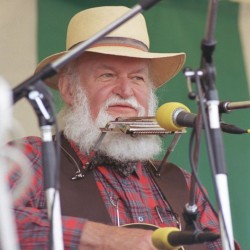
Utah Phillips
American Singer
| Date of Birth | : | 15 May, 1935 |
| Date of Death | : | 23 May, 2008 |
| Place of Birth | : | Cleveland, Ohio, United States |
| Profession | : | Singer |
| Nationality | : | American |
Bruce Duncan Phillips, the itinerant folk singer, songwriter, storyteller and social activist who jokingly called himself U. Utah Phillips, “the Golden Voice of the Great Southwest,” died on Friday at his home in Nevada City, Calif. He was 73.
Early Years
Phillips was born in Cleveland to Edwin Deroger Phillips and Frances Kathleen Coates. His father, Edwin Phillips, was a labor organizer, and his parents' activism influenced much of his life's work. Phillips was a card-carrying member of the Industrial Workers of the World (Wobblies), which were headquartered in Chicago. His parents divorced and his mother remarried. Phillips was adopted at the age of five by his stepfather, Syd Cohen, who managed the Hippodrome Theater in Cleveland, one of the last vaudeville houses in the city. Cohen moved the family to Salt Lake City, Utah, where he managed the Lyric Theater, another vaudeville house. Phillips attributes his early exposure to vaudeville through his stepfather as being an important influence on his later career.
Phillips attended East High School in Salt Lake City, where he was involved in the arts and plays. He served in the United States Army for three years in the 1950s. Witnessing the devastation of post-war Korea greatly influenced his social and political thinking. After discharge from the army, Phillips rode the railroads, and wrote songs.
Personal Papers
Archival materials related to Phillips' personal and professional life are open for research at the Walter P. Reuther Library in Detroit, Michigan. The papers include correspondence, interviews, writings, notes, contracts, flyers, publications, articles, clippings, photographs, audiovisual recordings, and other materials.
Death
Phillips died May 23, 2008, in Nevada City, California, from complications of heart disease, eight days after his 73rd birthday,and is buried in Forest View Cemetery in Nevada City.
Quotes
Total 21 Quotes
I'm here to change the world, and if I am not, I am probably wasting my time.
When I went to high school - that's about as far as I got - reading my U.S. history textbook, well, I got the history of the ruling class. I got the history of the generals and the industrialists and the presidents that didn't get caught. How 'bout you? I got all of the history of the people who owned the wealth of the country, but none of the history of the people that created it.
But if it’s true that the only true life I had was the life of my brain, what sense does it make to hand that brain to somebody for eight hours a day for their particular use on the presumption that, at the end of the day, they will give it back in an unmutilated condition? Fat chance!
As I have said so often before, the long memory is the most radical idea in America...
Sing your song Dance your dance Tell your story I will Listen and remember
I guarantee, that if I am elected, I will take over the White House, hang out, shoot pool, scratch my ass, and not do a damn thing . . . Which is to say, if you want something done, don't come to me to do it for you; you got to get together and figure out how to do it yourselves. Is that a deal?
They're going to clear cut your best thoughts for the sake of profit unless you learn to resist, because the profit system follows the path of least resistance and following the path of least resistance is what makes the river crooked!
My pacifism came after I joined the army and was shipped over to Korea. There was a little one-room orphanage there called Song-do. There were 180 babies in there, and they were GI babies. The U.S. government would not acknowledge this, and the Korean government had nothing to do with them. They were living on a 100-pound bag of rice a month. Some of those kids, when they were old enough, would go out and shine shoes. They would show up at the gate of our compound to shine shoes, and you'd swear they were looking for their fathers.
Folk music isn't owned by anybody. It is owned by everybody, like the national parks, the postal system, and the school system. It's our common property. There is nobody's name on it. Nobody can make money on it. It's not copywritten.
Chris Chandler is the best performance poet I have ever seen.
